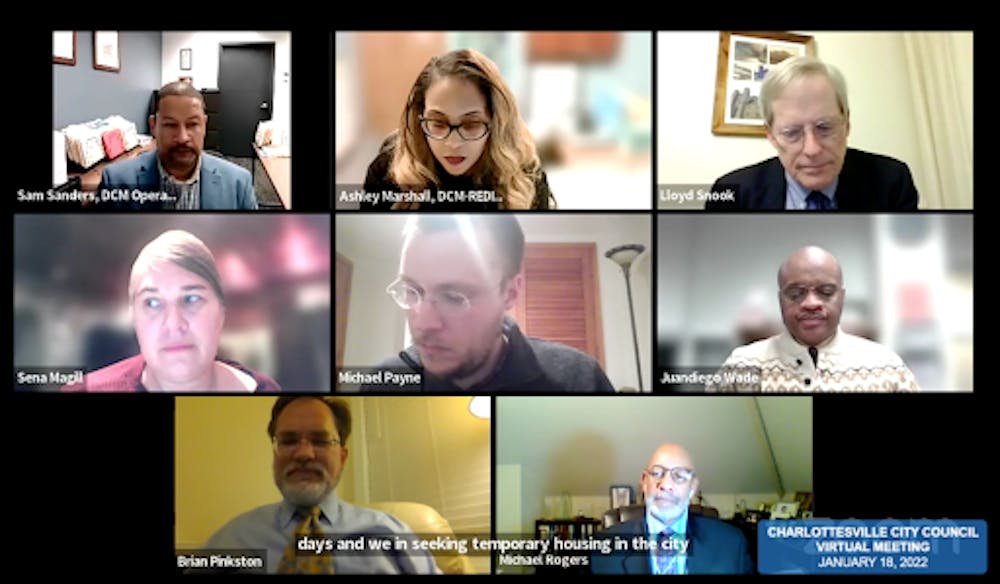City Council approved Michael Rogers to act as interim city manager in a Jan. 18 meeting after a long struggle to appoint and retain a manager. After discussing a new grant and local public spaces, the Council went into closed session to meet with legal personnel regarding ongoing lawsuits.
Rogers will take over as interim city manager beginning Jan. 1. Charlottesville’s previous interim manager, Marc Wooley, withdrew less than a month after accepting his appointment — Rogers will be Charlottesville’s seventh city manager since 2018.
Recommended by the Robert Bobb Group — a minority-owned national consulting firm that specializes in public and private sector services — Rogers will serve for a six-month period. Rogers previously served as deputy mayor and city administrator in Washington, D.C. Rogers named having an open and transparent government as a priority and has been touted by other government officials such as Charlottesville Mayor Lloyd Snook and Vice Mayor Juandiego Wade for his ability to help with the City’s budget and train other leaders.
“I look forward to coming to town, hitting the ground running, working with you, listening to you, understanding the issues that are immediately before you so that we can work on constructive solutions for addressing problems,” Rogers said. “I look forward to engaging with the staff and becoming a part of the team.”
The Council will continue its search for a permanent city manager with hopes to fill the position by June.
Council member Sena Magill also announced that the City and Albemarle County were awarded a criminal justice and behavioral health grant from the National Association of Counties — an organization which represents county governments in the U.S. — to put together a group of leaders in criminal justice and behavioral health from Charlottesville and Albemarle to create a framework that would “reduce reliance on incarceration.”
According to the NACo website, the team of leaders will work to improve transition and reentry into the community for freed prisoners and reduce stigma around substance abuse and mental health disorders. The team will also support non-carceral community based services.
Magill also announced an update on conditions within the Albemarle-Charlottesville Regional Jail in a statement by ACRJ Superintendent Colonel Martin Kumer after the jail experienced its second outbreak of COVID-19 in the past four months. As of Tuesday, the ACRJ has reported 65 cases among inmates. Cleaning supplies will now be distributed to inmates twice per day instead of once a day, and inmates are not being issued masks because they are in “a contained pod.”
Following Kumer’s statement, the Council discussed a request by Monticello Area Community Action Agency proposing a planned new development of affordable housing units and a childcare center on Park Street. The Council had previously heard several community concerns about the proposed development.
During the meeting’s public comment section, Charlottesville resident Cecelia Mills expressed concerns about community members’ ability to bring up disagreements related to the two planned new developments, including the Park Street project. Other concerns brought up included a potential loss of tree canopy due to new developments.
Ultimately, the Park Street development was approved as part of the consent agenda.
The Parks and Recreation Advisory Board then proposed names for the new properties added to the community parks system. With public submissions taken into consideration, the Board suggested “Jenkins Park” to honor Hudson Jenkins, who owned a livery stable on the land until it was destroyed by a fire in 1913, and “Heyward Community Forest” to recognize the Heyward family for giving 142 acres of their land adjacent to Ragged Mountain. The motion passed 5-0, with no changes to the proposal for these and the other four new park names.
James Freas, director of neighborhood development services, provided an update on the plan for developing a new zoning ordinance as a part of the Charlottesville Comprehensive Plan, which was passed in November. Freas said the drafting of the new zoning ordinance will ideally begin next week, and the process adopting the new ordinance is expected to be complete by winter or spring of 2023.
Freas also discussed plans for community engagement and education that would provide information on zoning to community members so they can “knowledgeably interact with and engage with the process [of updating the ordinance].”
Finally, Council voted 5-0 to endorse a letter urging Virginia’s legislators to remain in the Regional Greenhouse Gas initiative despite Governor Glenn Youngkin’s intentions to withdraw. The program funds programs that promote energy reduction for low-income residents.
“As a community of Virginia municipalities, we are proud of the progress our Commonwealth has made toward climate sustainability,” the letter read. “Climate change poses a significant risk to the health, livelihood, and economic stability of our communities.”
The next City Council meeting is scheduled for Feb. 7 at 5:30 p.m. Community members can find links to upcoming and previous meetings on the City’s streaming pages.







